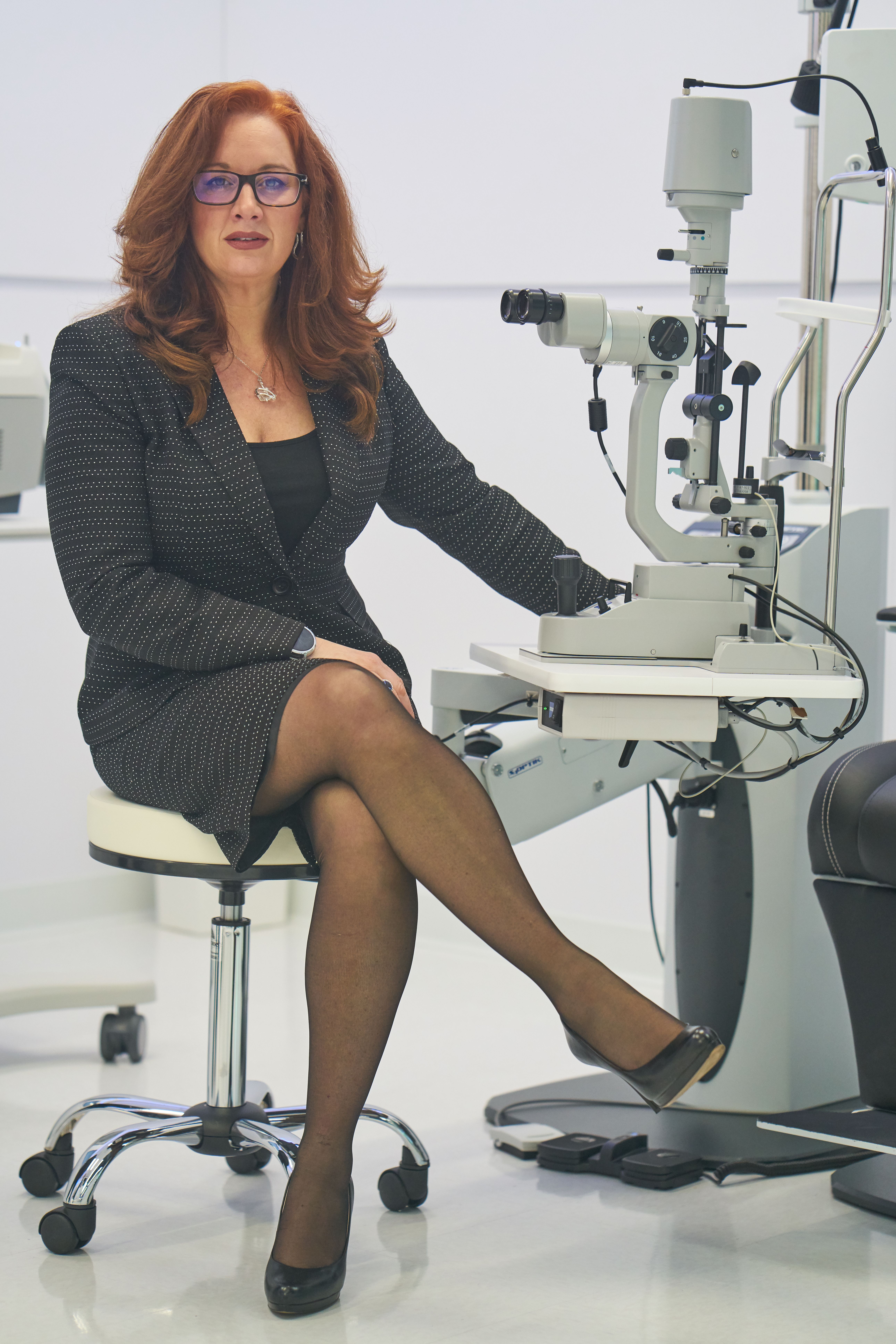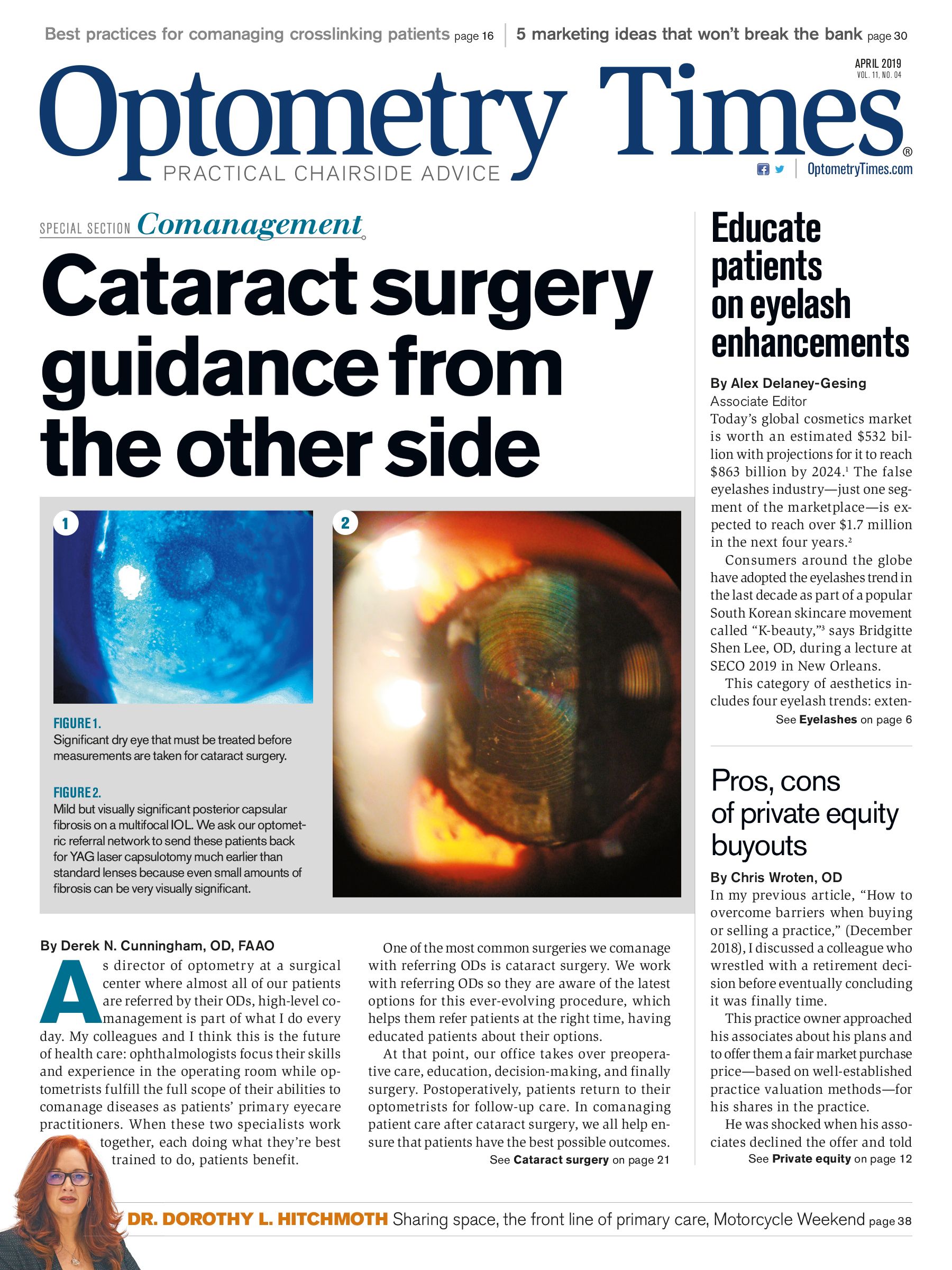- Therapeutic Cataract & Refractive
- Lens Technology
- Glasses
- Ptosis
- AMD
- COVID-19
- DME
- Ocular Surface Disease
- Optic Relief
- Geographic Atrophy
- Cornea
- Conjunctivitis
- LASIK
- Myopia
- Presbyopia
- Allergy
- Nutrition
- Pediatrics
- Retina
- Cataract
- Contact Lenses
- Lid and Lash
- Dry Eye
- Glaucoma
- Refractive Surgery
- Comanagement
- Blepharitis
- OCT
- Patient Care
- Diabetic Eye Disease
- Technology
Q&A: Sharing space with another OD, ODs on the front line of primary care, and Motorcycle Weekend
Dorothy L. Hitchmoth, OD, ABO, ABCMO, FAAO, is the owner of two practice locations and a senior business consulstant for Zeiss Meditech Global.

Meet Dorothy L. Hitchmoth, OD, ABO, ABCMO, FAAO.
1. Where did you grow up?
My father was career military so I grew up all over the world. I was able to live in Europe, I was able to live in Japan and when my dad retired we all moved back home. Home was in the greater Boston area, both of my parents are children of immigrants. I ended up completing all my education in the Boston area and the I ran for the hills. I now live in rural New Hampshire and really have been here most of my adult life.
2. Why private practice now?
The real story is that I’m crazy. [Laughs] I was at the VA for 22 years, the VA was a labor of love for me. From day one I was like “these are my peeps”, I understand the language, my father was career military, that’s what I grew up around. I thought it was an honor and a privilege to take care of these guys. I kept saying “I’m only going to stay a few years, I’ll leave next year.” I’ve had a private practice and been full time at the VA for that entire tenure.
About half way through my time at the VA I started consulting work because of the privileges that you are handed for being a VA doctor is professor appointments in a variety of places. I started a big teaching program. I'm also a bit of a fighter and became involved in organized optometry. I’m a past state president and have been involved with the AOA for 25 years. I love seeing patients! I get to visit with different, interesting people all day, everyday. In a rural area, there’s a real need. I have a lot of elderly patients with complex eye diseases and that’s really all I did at the VA. So it’s good.
3. Why did you choose to share space with another doctor for your second location?
It was really a simple decision. We were a 45-second walk from each other’s office in a really high rent area and I said, “hey Dr. Sam, why don’t we put everything under one roof and reduce costs and merge equipment. That took one or two sips of bad, brown liquor and the deal was done. [Laughs]
So we still have a partnership going and I’ll be shameless and say we need help up here! It’s really difficult to recruit young doctors to rural areas but I’m like hey, guys this is great! They’re safe areas, people need you, there’s like no crime, you know everything is good up here. We would love to have a partner or two. We are about 4 and a half hours from New York and a couple of hours from Boston. Not too bad, you can still get your city fix. With my consulting business, I actually travel all over the country. So I tell people you can go anywhere you want, airplanes are really cool technology, it’s great to be able to just come back home and just chill.
4. What's your favorite city?
That’s a tough question. San Diego’s pretty nice, I would say that’s pretty high on my list of places to visit. But Boston’s my favorite. Maybe because it’s more familiar, it’s an old city with a lot of history, there’s a lot of personal history for me. It’s almost like not a city but you have all the amenities of a city. The weather is great, it’s on the coast, great food, there’s a heavy immigrant population so it’s a multi-ethnic area which I like very much. That’s probably my top.
Related: Q&A: Art gallery and beer in the office, no office phone, and reggae music
5. What is your guilty pleasure food?
So my mom’s Italian, the list is really long. Chocolate. What else am I going to say? [Laughs] Dark chocolate to be really specific.
6. How do you educate patients that overall health affects ocular and vision health?
The conversations I have with patients all day long are really quite simple. Don’t smoke. Eat your fruits and veggies. Little bit of wine’s ok, not too much. Drink some water. Go outside. It’s that simple. [Laughs] Nobody believes me but these are the things you need to do to prevent going blind if you’re at risk for blinding eye diseases. My family is at risk for macular degeneration, there are millions of people at risk for this in North America.
And we know what the risks are that are associated with vision loss from that stuff so even if you get dealt a bad hand, you have the bad gene, eating fruits and vegetables everyday in a good quantity can actually slow these diseases down and prevent the devastating visual effects. No smoking! That’s the other big one. I go on the radio and talk about smoking and the eye. Members of the public think “oh, smoking’s bad for your lungs” but it’s one of the number one implications of eye disease, particularly eye disease. That’s my number one message.
Related: How to reduce vision impairment, promote eye health7. Has working for industry has changed your approach to patient care?
I work for Zeiss Meditech, they’re the primary business that I consult for right now. I think Zeiss is a great company, they have great products, love their philosophy. When I opened my new office, I decided in my little rural area I wanted the best of the best, the latest technology for my patients. I opened what I’m terming the Zeiss Center of Excellence. Working for industry has influenced the decision-making process: Should I buy this equipment, should I wait, if that costs too much money can I make it worth it.
8. What's something your colleagues don't know about you?
I don’t know, I’m a pretty chatty-Sally, it’s all out there. [Laughs] I do actually like to paint. That’s something that chills me out. Maybe when I stop running around so much, though I doubt that will ever happen, I’ll paint more. I love photography as well. In my Zeiss Center of Excellence I actually have all kinds of photo art all over my wall. I also have local artists displaying their art here. That’s something I like to support and do when I’m not working.
9. Why are you drawn to and passionate about charitable organizations and why should other ODs be more involved?
Not to get too biblical here but there’s this thing, to whom much is given much is expected. I try to live my life by that one simple statement. It’s been a privilege that I accidentally got to live all over the world. It’s been a privilege that I had a step up on education. It’s been a privilege that I have the ability to do something with that education. There are lots of people that don’t have those opportunities and they just need a hand up sometimes. Why wouldn’t you do that? If everybody did just a little bit for their neighbor or their friends- maybe there’s an old hippy in me. [Laughs]
Every time I’ve helped someone or become involved to help an organization or raise money, it’s paid me back in some way. Maybe not immediately and that wasn’t my expectation but looking back over 30 years of my adult life, I can at least look back and say I’m so glad I became involved in that or I’m so glad that I met this person who was inspiring that I never would have met if I had stepped out a little bit in some ways.
Also by Vernon Trollinger: Q&A: Contact lens research and innovation, playing sport, moving to Canada from the UK
10. How should optometry move forward?
I think we have no choice. Because we have this aging population who’s getting sicker, right? There’s a lack of primary care doctors, there’s a lack of health care providers in general. We’re going to have to find a way to provide better primary care advice, secondary care advice, and take prevention and wellness seriously. We interface with 200 million people a year in the U.S., we’re everywhere.
I think 90% of the Medicare population lives within 15 minutes of an OD. That’s astounding. I know there are communities where we’re the only doc or there’s just us and primary care. We better be telling patients from day one, don’t smoke, eat your fruits and veggies, make sure you see your primary care doctor; screen patients for conditions in a more robust way that can easily be uncovered in the optometry office. Taking blood pressure, taking blood sugar, doing robust family histories. I see us taking a real serious role on the primary care frontline.
Related: Why in-person care and technology must partner
11. Do you have any regrets?
Nope. That’s a categorical nope. [Laughs]
12. What's the craziest thing you've ever done?
They have this thing called Motorcycle Weekend in New Hampshire, it’s one of these big bike rallies. It’s in Laconia and I don’t live in that part of the state but I did the very first couple of years that I did move to New Hampshire. I was there maybe only a few weeks and then they have this big motorcycle rally. It was literally right in front of the house that I lived in at the time. I’m like, “Oh my God, this is New Hampshire? This is pretty cool!” I’m not entire sure that all my clothes stayed on for all of those rallies in my twenties! [Laughs] I always say, “Geez, if I run for office, how’s that going to play out?” I don’t know, I’m just really glad there were no cell phones that people could use to save pictures and send them all over the internet! [Laughs]
Read and listen to more Q&As here

